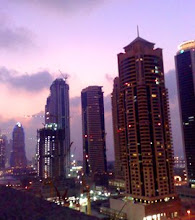Earlier this week, the British government has raised its terror warning to the highest level for its citizens living in the UAE. A statement posted on the Web site of the British Embassy in Abu Dhabi said the country has "a high threat of terrorism,” adding the kicker “we believe terrorists may be planning to carry out attacks in the UAE…attacks could be indiscriminate and could happen at any time."
Wednesday, June 18, 2008
Misreading the signs as UK raises terror alert level in UAE
Monday, June 16, 2008
Taxi driver road rage as Dubai's hyper-growth hammers earnings
 Hurried driver training and draconian penalties sees moral plummet among drivers of Dubai's 3,000-strong taxi fleet.
Hurried driver training and draconian penalties sees moral plummet among drivers of Dubai's 3,000-strong taxi fleet.
Thoughts on a misguided attempt to celebrate Filipinos
The piece goes on to extol the virtues of Filipino workers – though the credit seems to begin and end with the fact they speak good English and learn quickly. It manages to both patronize Filipinos and avoid criticizing the locals. If the Filipino Diaspora is to be celebrated is because Filipinos are prepared to travel to find work, accept pay and conditions that the locals wouldn’t accept, and, above all, work hard.
If the Arab News writer really wanted to shake things up, he might start a campaign to introduce a National Job Swap Day. Hopefully by then the Jeddah flower seller will have regained the use of his arms.
Sunday, June 15, 2008
Why does a Dh25 phone card cost Dh28?
A Dh25 Etisalat pay-as-you phone card will cost you Dh28 at the shop at Jumeirah’s Bab al Shams hotel. The bloke behind the counter smirked and shook his head when I asked him why there was a 12 per cent mark up. The place is out in the middle of nowhere, but as Jumeirah’s website explains, it’s only 45 minutes from the airport. Surely it’s not transport costs. Does anyone have an explanation? Feel free to mail any other examples of rip-off prices in
Thursday, June 12, 2008
Great customer service should be a thrill, not a chore
There is alarming lag between the rate of development of new business in
The Joshua Group says standards have fallen over the past seven years, and the retail sector is the worst offender. It says consistency of service, anticipation of customer needs, staff behavior, and the timely delivery of orders was way below international standards, some missing targets by as much as 60 per cent.
Kipp couldn’t agree more. There is a misconception that having someone fill your car, clean your windows, deliver your lunch to your desk and bring you a beer represents great customer service. It doesn’t. These are menial service duties.
Among other things, great customer service means remembering your drink order, anticipating future needs, learning what else the customer might need, and acting on feedback. And it starts by empowering the worker, not treating them (and paying them) like lackeys.
Wednesday, June 11, 2008
Ministry to tackle laborer summer break by having more inspectors work through the midday heat.
 The UAE’s Ministry of Labour says it is to get tougher with companies which force laborers to work through the midday heat. Site inspections will be increased to catch employers violating work-time restrictions, which come into force next month. Presumably this means there will be more inspectors having to work between 12.30pm and 3pm. Lucky them.
The UAE’s Ministry of Labour says it is to get tougher with companies which force laborers to work through the midday heat. Site inspections will be increased to catch employers violating work-time restrictions, which come into force next month. Presumably this means there will be more inspectors having to work between 12.30pm and 3pm. Lucky them.Tuesday, June 10, 2008
As oil price leaps, Saudi forced onto PR front foot
In an attempt to take the heat out of situation, the Saudi government has called for a meeting between oil producing and consuming nations about how to handle the price surge. It's not quite clear what this summit meeting will achieve, but, with the money rolling in, it doesn't do any harm to appear to be concerned.
A world pissed off with high oil prices might be just the thing to tempt Saudi into a higher public profile. Abu Dhabi, also sloshing with oil cash, can trumpet its carbon-free Masdar project. Dubai has its Blue Communities coastal living initiative. It may be time for Saudi to lead the world in some technology of the future, not an irritant of the present.

